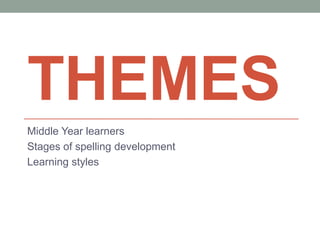
Themes
- 1. THEMES Middle Year learners Stages of spelling development Learning styles
- 3. Middle years as students Students in the middle years are going through a transition from childhood to adolescents. They go through many significant changes including… - Intellectual - Social - Physical - Emotional - Ethical - Moral They also more from concrete to abstract thinking
- 4. Middle years as learners Middle years learning style is different from early years learner. This is because - They seek challenges and engagement - They prefer an hands on approach to learning - They want a say in how they learn and what they are going to learn - They strive and desire independence
- 5. Middle year learners and technology Technology is making a huge impact on the lives of middle year students today. Many students see mp3 players, video games, mobile phones and particularly the internet a way of life rather than just a gadget. To them and so many adults, this is the way they communicate, research and live life. This is why the use of technology in the classroom is a major factor in the way Middle year’s students learn (NSW, 2009).
- 6. STAGES OF SPELLING DEVELOPMENT 1-Precommunicative- letters/symbols strung together randomly 2-Pre-phonetic- alphabet letters are recognised, spelling is attempted by sounding words 3-Phonetic- one-syllable spelling patterns and syllable combinations 4-Transitional stage- the spelling of meaningful parts of words (morphemes) 5- Correct spelling
- 7. • It is important to understand that not everyone will go through these stage at the same time. It will depend on the students learning capability, their access to resources and their learning integrity (Winch, 2010).
- 8. Stage 1- Precommunicative • During this stage letters and symbols are randomly strung together to make words. • They rely on the sounds of words to attempt to build their word. • There is no age bracket as students learn to spell at their own pace however it begins with the ages of 2 and 4 (Winch, 2010).
- 9. Stage 2- pre-phonetic • Spelling is attempted by sounding words out and using the knowledge of the sound of letters to help write words. • The meaning of the words is recognised. • Vowels are introduced • The concept of left to right is gained. • This stage begins between the ages of 3 and 6 (Winch, 2010).
- 10. Stage 3- Phonetic • Students are confident with making the connection between sound and symbol. • Students are developing word knowledge • The teacher will analyse the misspelling and give strategies to overcome them. • This stage occurs at the start of formal learning (5-7 years of age) (Winch, 2010). •
- 11. Stage 4- Transitional • Students use phonological, sight and morphemic knowledge to spell. • Students include vowels in every syllable and begin to spell digraphs. • An increased amount of words are now spelt correctly using a number of strategies • This stage occurs between the ages of 6 and 8 (Winch, 2010).
- 12. Stage 5- Correct Spelling • Are able to self correct and acknowledge misspelt words. • Students can deal with contractions, compound words, suffixes, prefixes and silent letters. • This stage can happen at any time however it is most common after the age of 8 (Winch, 2010).
- 14. Teachers Role • The teacher should be constantly recording how students learn to write and spell and record what strategies they used to do so. This will allow teachers to cater for all students learning preference and have a variety of activities that cater for them. The teacher also needs to make sure there are adequate resources in the room such as dictionary’s or even students personal ‘have a go’ books (Winch, 2010).
- 15. Visual Learners • Visual learners will often rely on how a word looks rather than the meaning of that word •Big • ‘have a go’ book would be very effective here as they will be able to write the word out numerous times and see which one looks right and if they are still not sure they can look it up in the dictionary (Whitton, 2010).
- 16. Auditory learners • Auditory learners rely on listening and speaking to learn. They understand things better if things are verbally explained rather then writing down. • A good strategy for these students for when they are trying to spell a word is to sound it out or say it in their head before writing it down (Whitton, 2010). •
- 17. Kinaesthetic learners • Kinaesthetic learners are people that learn better when they carry out the skill being learnt physically. • There are numerous different activities that could work for them. One could be the ‘have a go’ book as they are physically writing the word until they get it right. Another activity could be look the word up in the dictionary (Whitton, 2010).
- 18. References • Winch, G &Johnston, R & March, P & Ljungdahl, L & Holliday, M. (2010). Literacy: Reading, Writing and Children's Literature. Australia & New Zealand: Oxford University Press. • NSW Department of Education & Training. ( 2009). Our Middle Years Learners- Engaged, Resilient, Successful. An Education Strategy for Years 5-9 in NSW. Retrieved from http://www.dec.nsw.gov.au/detresources/Our_Middle_Years_gANxIHE euA.pdf • Whitton, D.(2010). Learning for Teaching, Teaching for Learning, 2nd edition. South Melbourne: Cengage Learning Australia
